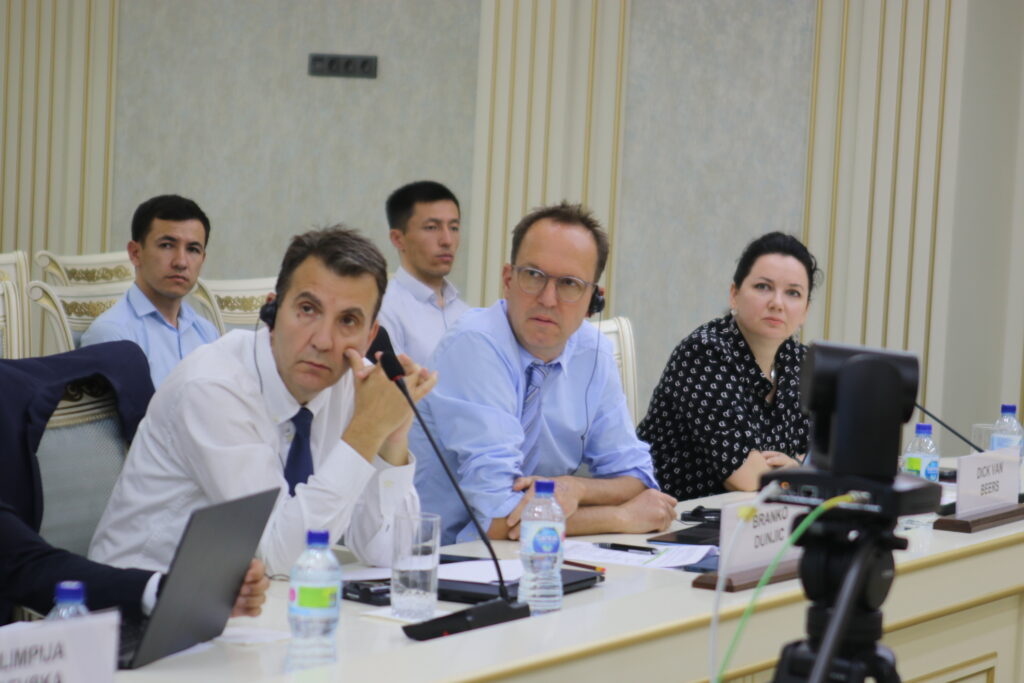On May 22 this year in IZPP jointly with UNIDO organized a seminar on “Contribution of eco-industrial parks to the development of circular and ‘green’ economy of Uzbekistan”.
During the seminar it was noted that Uzbekistan is confidently introducing elements of “green” economy considering them as one of the priorities of its development. Based on the Strategy for Transition to a «Green» Economy for the period 2019-2030, adopted in 2019, the country is gradually integrating climate goals into its long-term socio-economic agenda, encouraging decarbonization, resource conservation, and growth in «green» investments. The Green Growth Program, approved within the framework of the Development Strategy of the “New Uzbekistan” for 2022-2026, is a logical continuation of this work. It systematically expands the use of renewable energy sources, stimulates the adoption of resource-saving technologies in all sectors, and ensures more inclusive economic growth.
In line with its planned course, Uzbekistan is implementing the principles of the circular economy by creating eco-industrial parks. This initiative is outlined in Decree No. DP-436, signed by the President of the Republic of Uzbekistan on December 2, 2022.
Furthermore, in accordance with Decree No. DP-16 of the President of the Republic of Uzbekistan, dated January 30, 2025, the State Program for the Implementation of the Uzbekistan-2030 Strategy in the Year of Environmental Protection and the Green Economy was approved. This program defines several priority approaches to the country’s development, including:
careful conservation and rational use of natural resources, ensuring environmental sustainability;
sustainable financing of projects aimed at the widespread adoption of green economy principles and adaptation to climate change;
reducing the “carbon footprint” in the economy by widely using modern energy-saving technologies in economic sectors and the social sphere.
In the context of Uzbekistan’s state policy on developing a “green” economy, which has been implemented in recent years, a project is being carried out with the support of the United Nations Industrial Development Organization (UNIDO) and the German Society for International Cooperation (GIZ). This project aims to introduce the concept of eco-industrial parks by transforming two pilot industrial zones into modern eco-clusters.
One of the key national partners in this project is the Institute of Legislation and Legal Policy under the President of the Republic of Uzbekistan. With the help of UNIDO and GIZ, the institute organized a seminar on May 22 of this year. The seminar’s topic was: “The Contribution of Eco-Industrial Parks to the Development of a Circular and Green Economy in Uzbekistan”.
The main objective is to raise participants’ awareness of eco-industrial parks (EIPs) and their contribution to developing a “green” and “circular” economy in Uzbekistan. The analysis will focus on changes in industrial policy, including prerequisites for implementation and expected results, with the goal of creating conditions for implementing EIPs in accordance with international standards and sustainable development principles.
The seminar was attended by more than 40 experts, including representatives from relevant ministries, heads of pilot industrial zones, business leaders, scientists, and non-governmental organization representatives.
Participants in the seminar discussed ways to achieve a green transformation of industries, the EQuIP methodology for evaluating the sustainability of industrial zones, and how to practically implement the green growth program.
Participants noted that EIPs transform traditional industrial zones into resource-efficient clusters, reducing waste and environmental impact while increasing enterprise competitiveness and investment attractiveness.
UNIDO representatives emphasized that global best practices demonstrate that EIPs deliver tangible economic benefits, create jobs, and reduce environmental impact.
Participants unanimously agreed that the country needs the following:
- aligning national laws with international environmental and technical standards.
- the introduction of modern monitoring and reporting mechanisms for industrial production sites and their participants;
- further improvement of mechanisms to encourage industrial production sites to adopt green economy principles was also agreed upon, including through the introduction of industrial symbiosis.
At the end of the event, participants noted that the developed proposals would form the basis for draft regulatory and legal acts aimed at further developing the EIP and accelerating the country’s economic transition to environmental sustainability.





